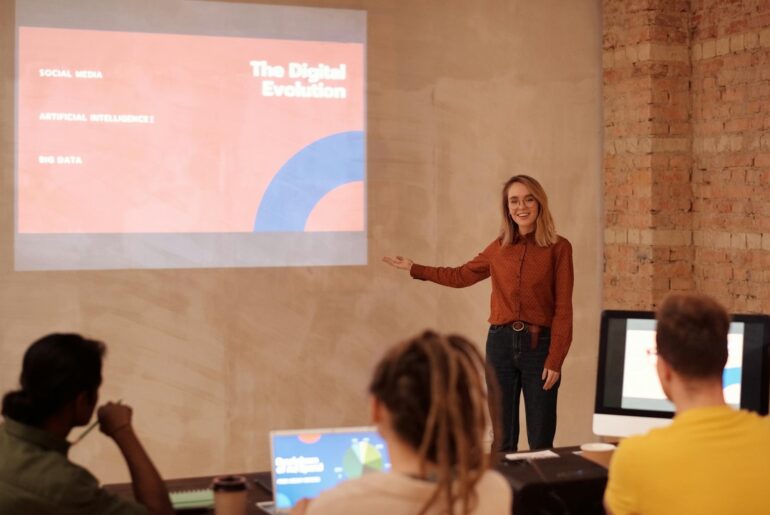This article may contain references to products or services from one or more of our advertisers or partners. We may receive compensation when you click on links to those products or services. Nonetheless, our opinions are our own.
The information presented in this article is accurate to the best of our knowledge at the time of publication. However, information is subject to change, and no guarantees are made about the continued accuracy or completeness of this content after its publication date.
- AI and the Future of Employment
- AI-Inspired Career Roles: Expanding Employment Horizons
- Refining Existing Skills for AI-Driven Employment
- New Professional Paths Emerging from AI Integration
- Building Capabilities for AI-Aligned Careers
- The Value of Human Skills in Automated Work Environments
- Planning Financially for Career Transitions in AI Fields
- Frequently Asked Questions: Professions Emerging from AI
- What are examples of roles created through AI expansion?
- Which sectors are seeing the most AI-driven job growth?
- Which skills are commonly required for AI-related positions?
- Are these entirely new roles or modified versions of old ones?
- Is continuous learning required to stay in these fields?
- Are AI careers mostly technical?
- Recommended Reads
AI and the Future of Employment
Artificial Intelligence is reshaping industries by creating new professions, not merely automating existing ones. Rather than eliminating all roles, AI is driving demand for expertise that merges technical knowledge with human insight. As AI becomes more embedded in infrastructure, services, and operations, the workforce must adapt to meet the demands of this transition.
AI-Inspired Career Roles: Expanding Employment Horizons
The adoption of intelligent systems in business, civic, and scientific domains has led to a range of roles that pair human oversight with machine capabilities. These positions often combine technical reasoning, creativity, ethics, and user experience.
Representative Roles
| Job Title | Description |
|---|---|
| AI Ethicist | Ensures algorithmic systems operate within accepted moral and social standards. |
| Data Storyteller | Transforms complex datasets into actionable and accessible narratives. |
| Smart City Analyst | Uses AI to enhance infrastructure planning and resource management. |
Other potential job titles include
- AI Algorithm Trainer
- Virtual Reality Experience Curator
- Cybersecurity AI Specialist
- AI Business Strategist
- Robotics Delivery Manager
- AI Content Personalization Designer
- Automated Customer Experience Planner
- Machine Learning Wellness Coach
These roles demonstrate the movement toward professions that incorporate both human insight and technological precision.
Refining Existing Skills for AI-Driven Employment
Many of these emerging professions can be accessed by adapting current skills rather than starting from scratch. Individuals in a wide range of disciplines are now expected to work with intelligent tools, manage data-driven systems, and interpret digital outcomes.
Application Areas and Impact
| Domain | AI Application |
|---|---|
| Marketing | Predictive modeling for advertising strategies |
| Healthcare | Diagnostic support and patient data monitoring |
| Finance | Automated fraud detection and investment risk analysis |
AI can support efficiency, provide greater accuracy, and allow professionals to focus more on analysis, creativity, and decision-making rather than repetitive tasks.
Voted "Best Overall Budgeting App" by Forbes and WSJ
Monarch Money helps you budget, track spending, set goals, and plan your financial future—all in one app.
Get 50% OFF your first year with code MONARCHVIP
New Professional Paths Emerging from AI Integration

As AI adoption increases, roles requiring both subject matter familiarity and applied technical skills continue to appear. These positions are often rooted in cross-functional knowledge, drawing on analytics, design, communication, and strategic planning.
Specialized Positions and Their Functions
| Role | Description |
|---|---|
| Data Curator | Ensures structured, reliable datasets for machine learning models |
| AI Trainer | Provides training data and real-world context for AI systems |
| AI Business Strategist | Aligns intelligent technologies with organizational objectives |
| Algorithm Bias Auditor | Identifies and addresses fairness issues in automated decisions |
As organizations prioritize fairness, transparency, and reliability, demand for these roles is increasing.
Building Capabilities for AI-Aligned Careers
Entering a profession shaped by artificial intelligence requires a combination of technical learning, soft skill refinement, and practical experience. Whether one is from a creative, managerial, or technical background, there are pathways to prepare for these shifts.
Areas to Develop
- Programming Fundamentals: Proficiency in Python, R, or SQL is frequently useful
- Data Literacy: Comfort with data modeling, visualization, and interpretation
- Communication: Clear explanation of insights generated through AI tools
Online education platforms, industry-specific certifications, and collaborative projects can provide structured opportunities to build these competencies.
The Value of Human Skills in Automated Work Environments
AI is well-suited for pattern recognition, automation, and rapid data processing. However, it lacks the emotional and creative capacities that are integral to many professional functions.
Human-Centered Strengths in Emerging Roles
- Relationship management and negotiation
- Strategic thinking and original problem-solving
- Flexibility in changing environments
| Traditional Position | AI-Influenced Evolution |
|---|---|
| Market Research Analyst | Consumer Behavior Specialist |
| Customer Service Representative | Customer Experience Designer |
| Administrative Assistant | Digital Workflow Coordinator |
These shifts reflect a movement away from procedural execution and toward insight-driven responsibility.
Planning Financially for Career Transitions in AI Fields
Changing careers or reorienting skills may involve a period of financial uncertainty. Whether funding new certifications or adjusting to a temporary income reduction, thoughtful planning is important.
Budgeting for Professional Shifts
- Maintain savings to cover several months of expenses
- Allocate money toward relevant learning resources
- Investigate training stipends or public funding opportunities
| Expense Category | Suggested Allocation (%) |
|---|---|
| Housing | 30 |
| Learning and Certifications | 15 |
| Emergency Savings | 20 |
| Living Costs | 25 |
| Additional Investments | 10 |
A structured financial approach reduces risk and allows smoother entry into new roles.
Frequently Asked Questions: Professions Emerging from AI
What are examples of roles created through AI expansion?
Some of the most relevant include algorithm fairness reviewers, robotics operations managers, AI wellness professionals, and personalized learning system designers.
Which sectors are seeing the most AI-driven job growth?
Industries such as healthcare, logistics, marketing, education, and financial services are rapidly incorporating AI technologies, leading to expanded career opportunities.
Analytical reasoning, communication, and programming ability are among the most in-demand. Familiarity with data management and ethical considerations is also important.
Are these entirely new roles or modified versions of old ones?
Many are a combination of both. For example, content creation and customer engagement positions now often involve co-working with AI tools or managing outputs from automation systems.
Is continuous learning required to stay in these fields?
Ongoing learning is a standard expectation. Technologies and tools evolve rapidly, so staying current through courses, mentorship, and practice is recommended.
Are AI careers mostly technical?
Not necessarily. Some positions require a deep technical background, but others focus on communication, analysis, or project coordination, all of which are accessible with non-engineering experience. Can AI-related roles support remote or hybrid work models? Yes. The nature of these jobs often allows flexibility, including remote analysis, content creation, or collaboration on virtual platforms.

Reviewed and edited by Albert Fang.
See a typo or want to suggest an edit/revision to the content? Use the contact us form to provide feedback.
At FangWallet, we value editorial integrity and open collaboration in curating quality content for readers to enjoy. Much appreciated for the assist.
Did you like our article and find it insightful? We encourage sharing the article link with family and friends to benefit as well - better yet, sharing on social media. Thank you for the support! 🍉
Article Title: AI’s Impact on Jobs: New Careers Shaping the Future of Work
https://fangwallet.com/2025/07/04/ais-impact-on-jobs-new-careers-shaping-the-future-of-work/The FangWallet Promise
FangWallet is an editorially independent resource - founded on breaking down challenging financial concepts for anyone to understand since 2014. While we adhere to editorial integrity, note that this post may contain references to products from our partners.
The FangWallet promise is always to have your best interest in mind and be transparent and honest about the financial picture.
Become an Insider

Subscribe to get a free daily budget planner printable to help get your money on track!
Make passive money the right way. No spam.
Editorial Disclaimer: The editorial content on this page is not provided by any of the companies mentioned. The opinions expressed here are the author's alone.
The content of this website is for informational purposes only and does not represent investment advice, or an offer or solicitation to buy or sell any security, investment, or product. Investors are encouraged to do their own due diligence, and, if necessary, consult professional advising before making any investment decisions. Investing involves a high degree of risk, and financial losses may occur including the potential loss of principal.
Source Citation References:
+ Inspo
There are no additional citations or references to note for this article at this time.











































